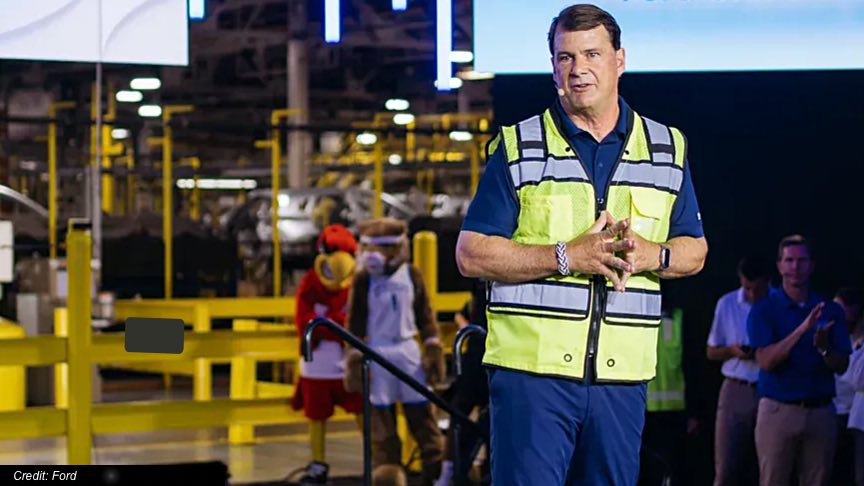According to Farley, Ford is introducing what it calls its "Universal EV Platform" that has been the result of an investment of $5 billion in plants in Kentucky and Michigan. The initiative revenvisions the production process for automobile assembly, with the end goal to mass produce an affordable range of vehicles built in America for American families.
"As with the Model T, Ford is again betting big on America," Farley said. "In Louisville, Kentucky, the reinvention of our company begins in earnest, with the implementation of an innovative manufacturing process to bring this platform to life."
The Ford CEO continued:
We designed this platform to be the foundation for a new generation of electric vehicles. It is flexible enough to underpin trucks, cars, and everything in between.
Vehicles assembled on this platform will be affordable for the average family — but also highly efficient, customizable, and fun to drive. And they won’t be stripped down to the bare essentials.
Instead, these vehicles will be packed with innovative features and new software experiences that set them apart — and make people want to drive them. Better yet, they’ll improve over time with over-the-air updates that continue to add new capabilities where available.
Ford has been able to realize this vision because of a unique formula. We combined more than 120 years of manufacturing experience with the agility and inventiveness of a start-up “skunkworks” engineering team in California.
The company says that the new Universal EV Platform will be built using what it calls a "New Universal EV Production System." Calling the new process an "assembly tree," the company claims its new approach will be more efficient than the traditional assembly line process first pioneered by Henry Ford over a century ago.
According to Ford's announcement, "Instead of one long conveyor, three sub-assemblies run down their own lines simultaneously and then join together."
The company's goal is to produce a vehicle that will be affordable, but not basic and stripped down, that nonetheless can outperform some of today's Mustangs, while still offering truck-like cargo utility.
First to be produced with an eye towards meeting these goals is a mid-size truck that will have more passenger space than a Toyota RAV4 while still having a "frunk" and a bed in the back.
The company says the new truck will have "a low center of gravity from the battery, instant torque from electric motors and obsessive chassis engineering will make it fun to drive. The midsize truck will have a targeted 0-60 time as fast as a Mustang EcoBoost, with more downforce."
The EcoBoost Mustang is no slouch. According to MotorTrend, the 2025 model can get to 60 mpg in just under 5 seconds. Not so long ago, that was considered near exotic car-level performance. Today, it's the base model Mustang!
"We applied first‑principles engineering, pushing to the limits of physics to make it fun to drive and compete on affordability," said Doug Field, Ford's head of EV design. "Our new zonal electric architecture unlocks capabilities the industry has never seen. This isn’t a stripped‑down, old‑school vehicle.”
Ford's investment in the new EV platform and manufacturing process will result in thousands of jobs gained or retained in both Kentucky, where the vehicles will be assembled, and in Michigan where Ford operates it's battery manufacturing facilities. The new vehicle will be powered by new battery technology as well, in the form of lithium iron phosphate prismatic batteries.
This type of battery does not use nickel and cobalt, making them much less expensive to produce by avoiding the supply chain issues inherent in nickel and cobalt supplies. They also have longer life cycles and are generally considered a safety battery technology.
Ford announced its intention to manufacture the batteries about 100 miles west of Detroit in 2023. At the time, CBS News reported that Ford's effort would use "technology, some equipment and workers" from "China's Contemporary Amperex Technology Co. Limited or CATL which is known for its lithium-iron-phosphate expertise."
Still, Ford CEO Farley emphasized that this initiative was American in nature.
"Ford is going to deliver what no other automaker has been able to: a family of affordable, adaptable electric vehicles that offer multiple body styles for work and play — including for export — and whose LFP batteries will be assembled in America, not imported from China," the man running Henry Ford's company said.
Farley continued, with complete with throwback reference to the earlier American inventor and industrialist's most famous car -- the Model T.
"This is a Model T moment," Farley concluded. "And it’s bigger than Ford — it's a big win for America’s future and for our customers everywhere."


